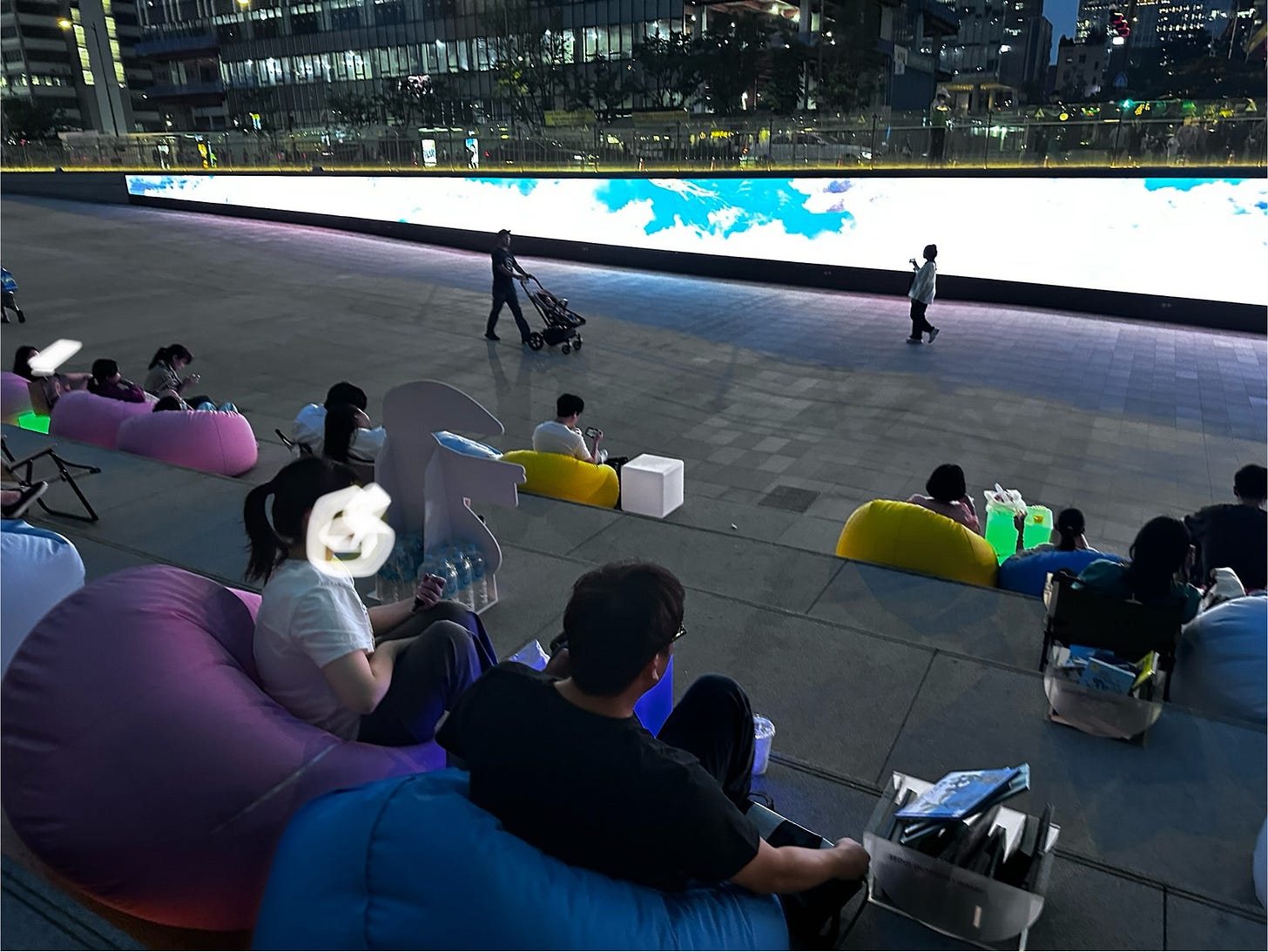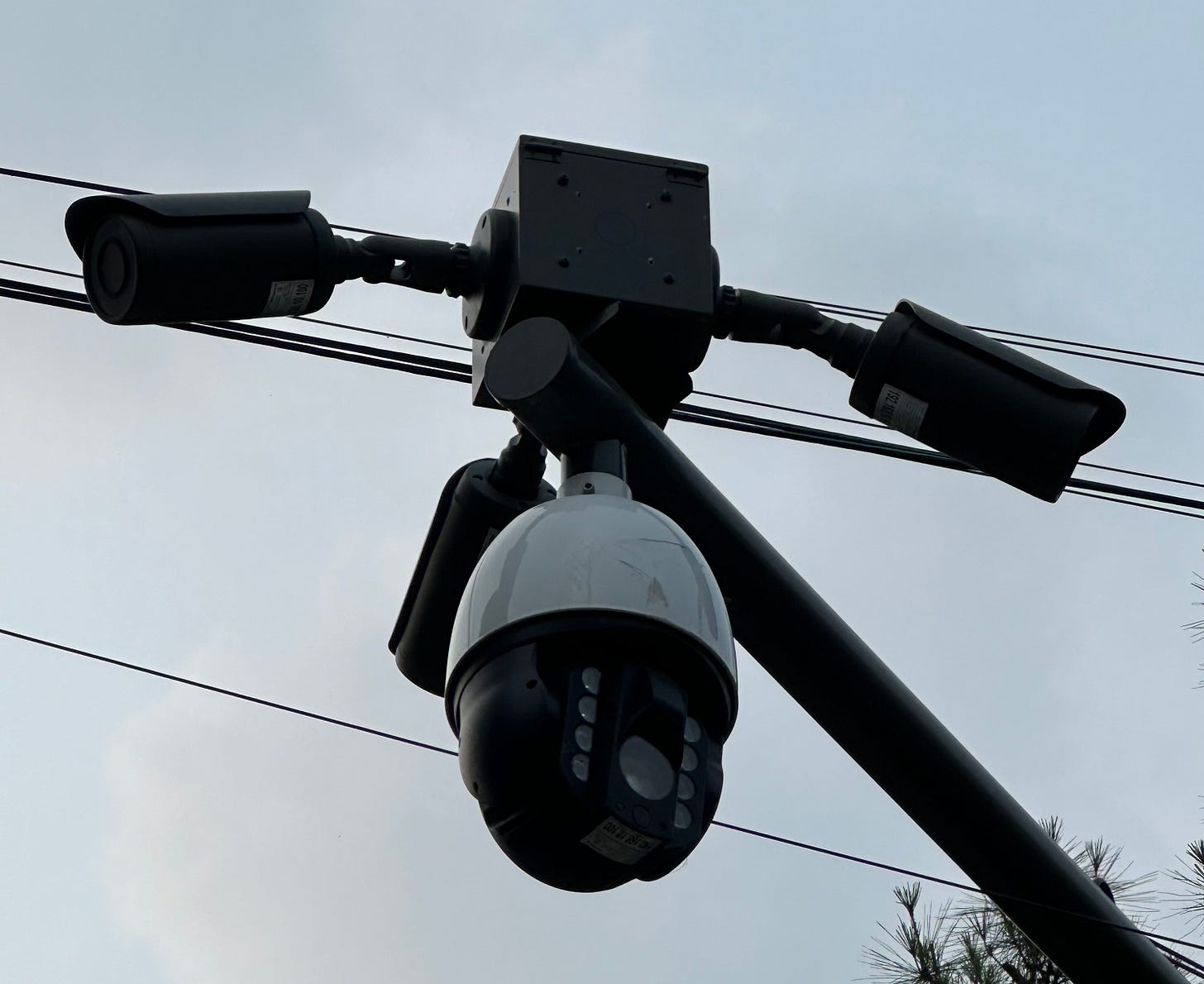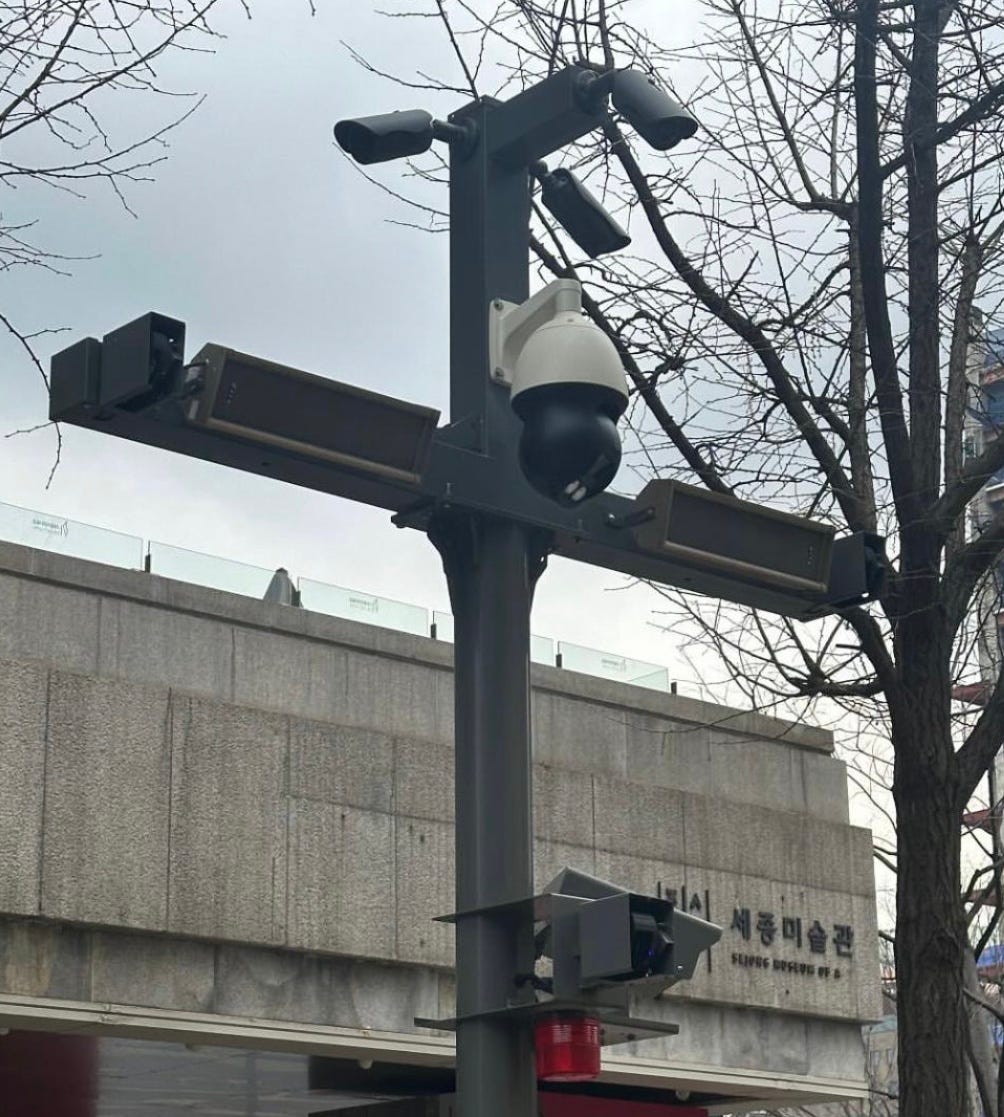Part I. From the Metro to the Restaurant
Getting out of the Gwanghwamun station, I smelled a slight bitterness and acidity in the air. Something was cremated. Plastic? I don’t know. A petrolic whiff of burnt chemicals disturbed my senses. The air was chalky too. I looked at the air quality meter by the exit. “Good,” it said with a green smiley emoji. For a split second, I thought my olfaction was off. I sniffed the air again. The meter was definitely giving the wrong information. Instantly, I felt annoyed by this betrayal. My tax money was wasted again. But, paradoxically, I slowly found comfort in knowing that human senses were still better than the machine’s.
I walked up the open-air ramp that merges with Gwanghwamun Plaza. The right side wall of this walkway is entirely a screen that stretches about 60 meters long. Amorphous vector patterns were swirling from end to end. On the left side, bean bag chairs were placed on the concrete ground, directly facing the screen. Sunken in the cushions, people were blankly staring at the image. Oblivious to the pollution, they appeared to be tripping into a state of hypnosis under the influence of LED lights.
Not wanting to be tamed by the sedating effect of the screen, I scurried off the walkway. Screens really are a thief of mind.
On the plaza, I locked eyes with a surveillance camera suspended over my head. These cameras hang from the street poles like giant spiders. They have a black ‘thoracic’ box with ‘legs’ sticking out of its sides. Each ‘leg’ is a camera, covering one direction of the compass. On the base surface of the box, a spherical ‘head’ is attached. Equipped with one central lens and eight smaller ones around it, the head can rotate to fixate on a chosen subject. A state-of-the-art surveillance machine. And just like spiders that have hatched eggs, these CCTVs have spawned in their numbers since Covid. Seoul is now the second-most surveilled city outside China, after Delhi.
“What illegal things do you do to feel bothered by CCTVs?” a friend once joked about my trepidation over the proliferating cameras. Ultra-tech surveillance doesn’t bother many people here. But it bothers me tremendously. Because my Western liberal arts education taught me about personal agency. The sense that one is in charge of one’s own life with the freedom to choose one’s own action. In the streets of Seoul, I feel like a prisoner to CCTVs. Like my existence is contained in the lens of the beholder. If I am a law-abiding citizen, why should I be monitored everywhere I go? And why such a threatening level of surveillance? Do these ‘spiders’ scan my face and my iris? I don’t know. Minority Report was supposed to be a fictional Hollywood movie, not a blueprint for reality.
To get to my dinner, I only had one street to cross. Standing on the Southern edge of the square, I waited for the traffic lights to change. The evening in Gwanghwamun Plaza dazzled with lights emanating from LED billboards. On the biggest screen, LG Electronics played its ad. “Together, a Good Future,” the slogan flashed against a blinding white background. It then transitioned to promote a laundry machine. A weather-reading AI washer that can auto-decide the best temperature to wash clothes, in order to keep the garments fresh under the day’s weather.
I wondered what was “good” about this machine. The exactitude of the water temperature at which my shirts are washed doesn’t make a speck of difference in my life. But letting machines make decisions for me - even for my laundry - would. Because what choices would be left for humans to make if machines run everything? What would be the purpose of my existence? Is living under mechanical automatism really a “good future?” All sorts of questions ran through my head. But I knew that worrying about it was useless. Because, regardless of my will, this technological “advancement” could soon become the norm for all washers, leaving no simpler option behind. Like a silent perpetrator, technology always pushes for “conveniences'' that I do not need, with the price of taking away a piece of my autonomy. It is the reason why I do not use Alexa, Siri, ChatGPT, or a self-operating machine.
Across from the LG ad, a government campaign about climate change played. “Seoul Green Vibe,” it said ironically, through the hazy atmosphere of the Seoul smog. Diagonal to it, Anya Taylor-Joy stared at passers-by while glittering in a Tiffany & Co. diamond necklace. Next to it, a K-pop singer danced vigorously against a fast changing background in an ad for a hangover cure. Standing on the tip of the plaza, I was encircled by LED screens flashing rapidly over my head.
In weaponry, there is something called an LED incapacitator. It’s a flashlight used by intelligence agencies to stun their targets with extremely bright strobing lights. The rapidly changing light patterns overwhelm the brain, causing disorientation and nausea. Albeit to a lesser degree, standing on the plaza, I must have had a similar reaction to the strobing effects of the screens. Involuntarily, I felt my muscles stiffening. I felt a little nauseous too. It’s a torturous thing to be surrounded by screens all over the city. But there is no way to escape their omnipresence. Consent is an inapplicable concept when it comes to technology.
7:06pm, I glanced at my phone. I was already late. The traffic lights changed finally and I tried to rush through the crowd.
People were moving slowly. Many had their eyes glued to their phones. Seoul city even installed lights on the sidewalk grounds to keep them from getting run over by cars.
Almost instinctively, I looked up to the sky as if to break away from the herd. And I saw the large brown building that looks like 6 giant crates are stacked on top of each other. My destination. This office building is wide enough to cover an entire block of Manhattan. Inside, some 20+ restaurants and shops occupy the first 5 floors. Most new buildings nowadays have a mall of eateries and shops on their lower floors. People can spend their entire days indoors, without stepping a foot outside. Our culture has become all about containing, curating and controlling. In this environment of circumscription, I can feel the walls closing in on what it means to be human, inch by inch, day by day.
I went up 5 escalators to the last floor of the mall. Ambient blue lights were glowing at the far end of the granite corridor.
At 7:13pm, I arrived at the restaurant.
[To be Continued in Part 2]







Awesome descriptions and reflections, Jisoo. Great stuff. Can’t wait for part 2!
Love the imagery! George Orwell meets Edgar Allen Poe